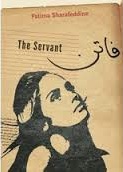
The Servant
Written by Fatima Sharafeddine
Groundwood Books, 2013, 157 pp.
ISBN: 987-1554983070
Faten hates herself right now. She loathes the prison she is trapped in. How did she get here? Why doesn’t she rebel? Why does she submit to what the others want? Why is she afraid of her father? She is here today because of him. Is it only fear, or hate, as well? As for her mother, why is she so weak? Why didn’t she stop him from turning their daughter from an excellent student into a house maid? (pp. 54-55)
This quote reflects the crux of this young adult novel. Set in Beirut, Lebanon in the 1980s, The Servant follows the trajectory of a cowed and scared teenaged Faten who is thrust from her home to support her family and her transformation into a young woman who creates her own home and future. This story, while originally published in Arabic and set in the Middle East, is not centered on the strife of warring factions or the Christian/Muslim conflict in Lebanon, but rather on the struggle of a young “everywoman” to create her own life despite the patriarchy surrounding her.
This struggle makes a good story. The author presents characters who are multi-layered. Faten helps the reader to see good and bad in everyone except her father. Faten’s father is never forgiven nor are his actions explained. The father’s character is never fleshed out and he is a one-dimensional tyrant.
The Servant is a romance with a twist. Faten is attracted to her neighbor, but more importantly, hopes he will help her attain her dream to become a nurse. She pursues him and starts her quest for agency, a theme that is reflected throughout the novel as the young adult characters negotiate the chasm between what they want and what their families expect of them. This shared struggle wherever and whenever it is set is what makes this text accessible to anyone who has tried to break free.
This novel offered a glimpse into a culture that really isn’t all that foreign. There is none of the exotic “Orientalizing” in The Servant. The author was able to write in a way that universalizes how women can overcome patriarchy and that universalizes the very real struggle that still exists in many places around the world.
This novel would work well in a text set of books highlighting the lives of girls/women in the Islamic world, such as Shabanu by Suzanne Fisher Staples (1989) and Persepolis by Marjane Satrapi (2003). However, in light of its universal appeal, it might also be paired with titles such as Between Sisters by Adwoe Badoe (2010) and Diary of Ma Yan: The Life of a Chinese Schoolgirl (Ma Yan, 2005).
Melissa B. Wilson, Southeastern Louisiana University, Hammond, LA
WOW Review, Volume VI, Issue 3 by Worlds of Words is licensed under a Creative Commons Attribution-NonCommercial-ShareAlike 4.0 International License. Based on work at https://wowlit.org/on-line-publications/review/vi-3/
